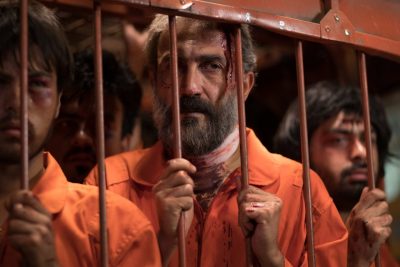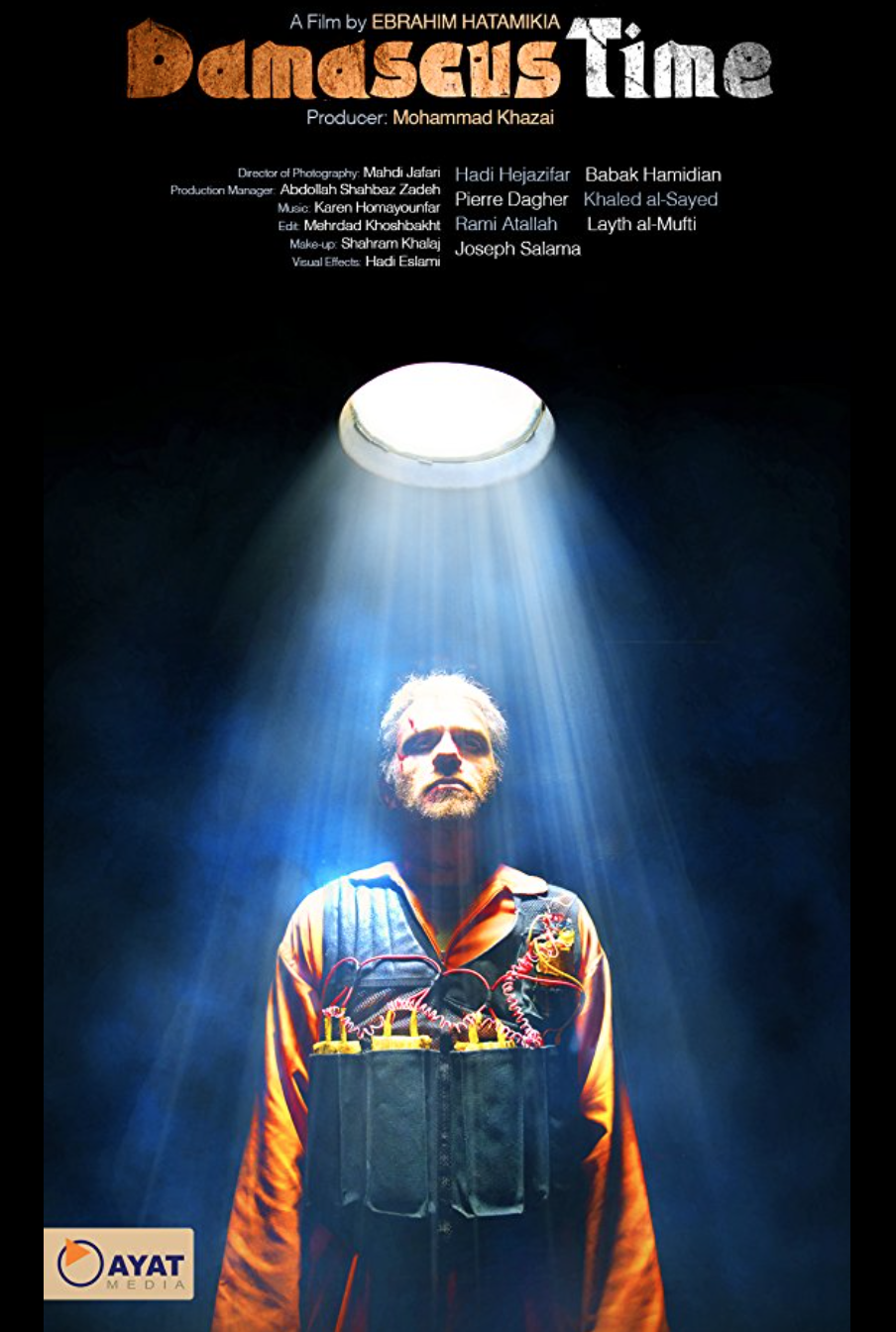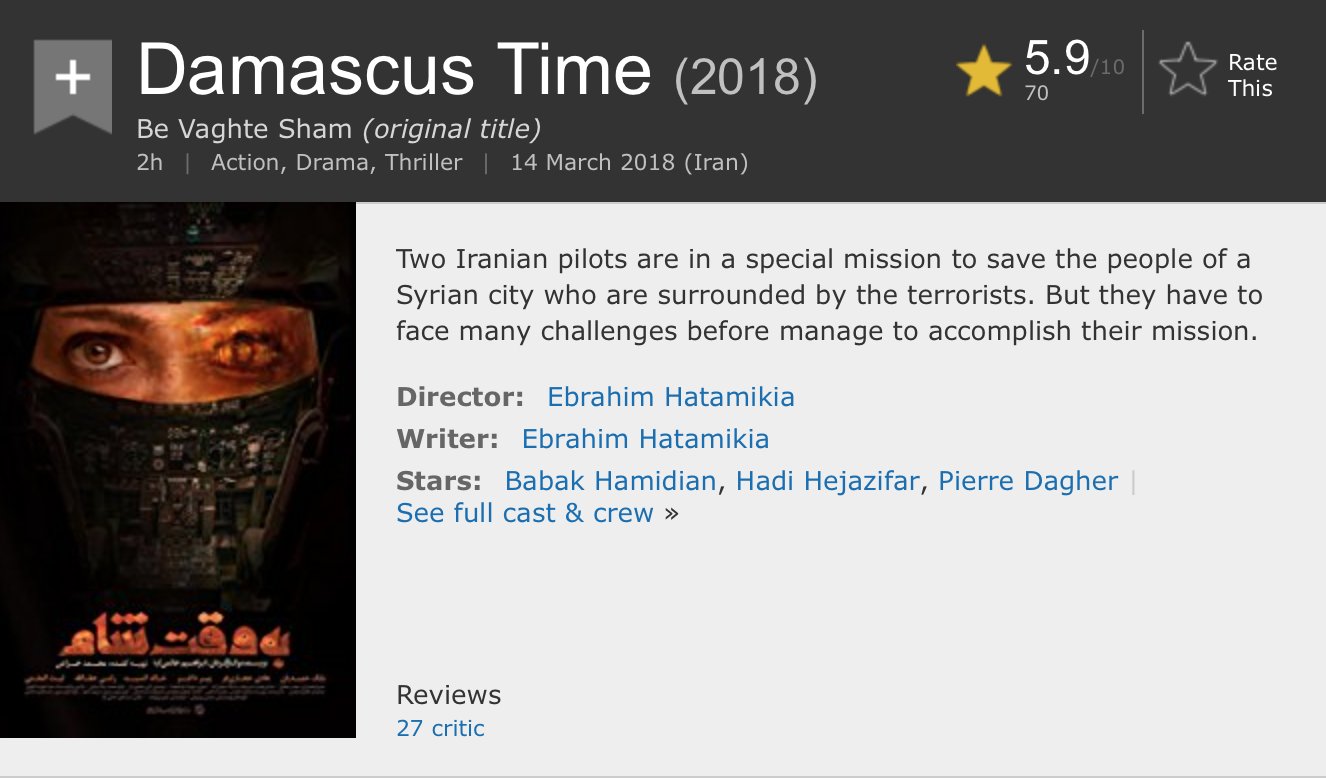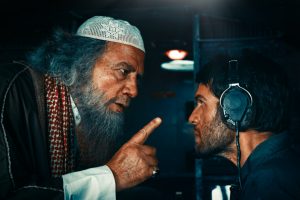“Damascus Time”: A Drama Movie on the “Islamic State” (ISIS-Daesh)
A review of the movie Damascus Time by Ebrahim Hatamikia

Two Iranian pilots, carrying a cargo of humanitarian relief supplies, are in a special mission to save the people of a Syrian city surrounded by ISIS terrorists. However; they face many challenges as ISIL soldiers attack and capture them. This is the story of “Damascus Time”, a new drama movie by Ebrahim Hatamikia, the internationally renowned director.
Hadi Hejazifar, Babak Hamidian and a number of Syrian as well as Iraqi actors star in this movie, which narrates a very different story of the pain and suffering of the people of Syria and Iraq.
The movie, screened in Iran’s international film festival had a record of 8 nominations and won three Crystal Simorghes in best director, best music and best sound mixing.
Hatamikia has previously denounced the global film industry for their very limited attention to ISIL crimes, saying this general boycott has motivated him to start producing movies about the terrorist group’s brutality.
Calling himself a “humble soldier of Islamic Republic of Iran”, he has presented “Damascus Time” to those who have sacrificed their lives in fighting ISIS.
How the movie is different?
*
Hatamikia has considered a comprehensive point of view in his movie. One of the characters is a newlywed man, who has voluntarily gone to Syria while his mother in low, is strongly opposed to his decision and tries to make him return. This woman represents a part of Iran’s society who have doubts about Iran’s help to fight ISIS and western main stream media usually boast about their numbers.
The movie also pictures the role of the Saudi Arabia as well as American and European jihadi forces, who are so lost due to the economic pressures and culture contradictions that have turned to extremists.
Tehran has always criticized the US role in the war against ISIS, as Washington supports the terrorist groups to confront Bashar Assad regime, while portrays itself as the savior of the Syrian people.
Stressing on the support of “the oppressed”, Islamic Republic of Iran has been active in the war against ISIL as the groups emerged in the reign by deploying military advisors to Iraq and Syria. Many Iranian people have also voluntarily gone to fight the extremists.
The movie was warmly welcomed by the audience and admired by many Iranian officials. The Iran’s Quds force commander, Qasem Soleimani and Iranian FM Mohammad Javad Zarif have both praised Hatamikia’s latest movie as “masterpiece.”
Iran’s heroes admire the movie
 Having watched the movie, General Soleimani told me the movie was so impressive that made him cry, adding that the ISIL’s crimes as well as the pain of the Syrian people are truly reflected in this movie.
Having watched the movie, General Soleimani told me the movie was so impressive that made him cry, adding that the ISIL’s crimes as well as the pain of the Syrian people are truly reflected in this movie.
He appreciated Hatamikia and kissed his hand with great respect “on behalf of all the fighters against ISIL.”
Iran FM also described the movie as unique “masterpiece,’ adding that “it was really unmatched.”
“The film is about the valor of the heroes who fought for all of us, it is a perfect image of men and women who strived to remove this disaster [Daesh] that struck the region,” he told me.
The Chief of General Staff for Iranian Armed Forces General Mohammad Bagheri admired the movie as “noble” saying that it had been successful to portray the bravery of the fighters against ISIL.
In my question about his opinion on the movie, he added:
“having watched the movie, I would love to heartily appreciate General Soleimani and all the Holy Shrine Defenders who sacrificed their lives to secure the peace in the region.”
About Owj Arts and Media Organization
Damascus Time was produced by “the Owj Arts and Media Organization” a Tehran-based institution producing revolutionary works in art and cinema.
A well-known movie by Owj is “Bodyguard”, the story of a veteran assigned to protect a young nuclear scientist that was well received by the audience last year.
The organization, determined to be active in Resistance front, also provides cultural package for the war-hit people of Syria and Iraq, one of them destroyed in a missile attack by Israel on the Damascus Airport last July.
Owj encourages the alternative media around the world to be united in order to fight the dominance of main stream media and reflect the truth worldwide.
Here is a short clip from the film. You may download the entire film here.
*
Mostafa Afzalzadeh is a journalist from Iran who covered most of the Iran nuclear negotiations with 5+1. He has also reported from war zones in Syria and Iraq.
All images in this article are still captures from the film.



